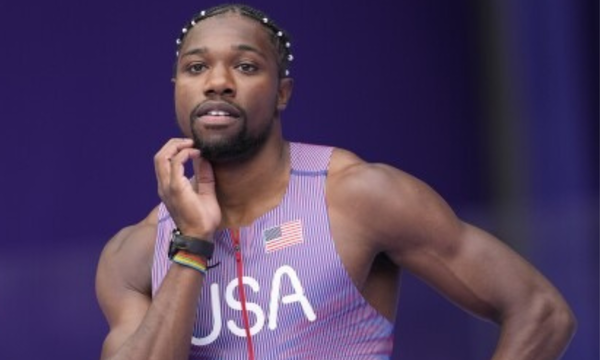

When you think of flashy athletes, names from the NBA and NFL probably come to mind first. Basketball and football stars don’t just dominate their sports; they own the spotlight with their bold fashion choices. Whether it’s custom-tailored suits, high-end sneakers, or designer streetwear, their pre-game outfits make headlines. Their personal brands extend far beyond what they do on the court or field.
But what about track and field? This sport produces some of the fastest and most powerful athletes in the world. Olympic champions, record-breakers, and global superstars emerge from track and field, yet the sport struggles to break into mainstream fashion conversations. Why don’t we see track athletes leading fashion trends the way NBA and NFL players do? Why is track and field’s cultural influence not as potent? Well, track sensation Noah Lyles claims there is a very dark reason for the same.
ADVERTISEMENT
Article continues below this ad
Noah Lyles talks about the dark reality of track and field
For athletes like three-time Olympic medalist Will Claye and sprinting superstar Noah Lyles, the answer isn’t about talent or personality, instead, it’s about money. In an interview with Sarah Gearhart on 31st January, Will Claye said, “I think it’s a little tougher though because we’re not getting paid [as much] as NBA and [NFL] players.” Pointing out that basketball and football stars sign massive contracts and land lucrative sponsorship deals, while track athletes often have to fight for financial stability. And that directly affects their ability to make bold fashion statements.
Claye said all this to support Noah Lyles when he said, “Track and field has so many personalities, especially when it comes to fashion, I believe our sport has just as much potential as any other sport, but to reach that bigger demographic, we have to thrust ourselves into conversations that we aren’t used to being in.” Lyles, known for his vibrant outfits and bold personality, believes track and field has just as much potential as any other sport. He sees the personalities, the confidence, and the hunger for greatness among his fellow athletes. But he also knows that breaking into the fashion world requires more than just style, it takes financial power as well.
While Noah Lyles and Will Claye, who came in support of Noah’s view, want track and field to embrace fashion and personality, there’s a harsh truth they both acknowledge, money remains a major barrier. Unlike the NBA and NFL, where even bench players earn millions, track athletes often rely on prize money, sponsorships, and appearance fees.

What’s your perspective on:
Is the lack of financial support holding back track and field's cultural impact compared to other sports?
Have an interesting take?
This financial gap makes it difficult for athletes to invest in designer clothing, custom outfits, and high-end collaborations. As Claye points out, purchasing power is a real challenge. And it’s not just about looking good, fashion is a tool for self-expression, confidence, and building a personal brand. Without financial backing, many track athletes struggle to showcase their personalities the way they want to. “If we want to see new heights for our sport, we have to do new things. Fashion is a great gateway to share those personalities,” Noah Lyles added. And it’s not only Noha or Claye who thinks this way, many other track and field stars raised their concern before.
Track and Field athletes weigh in on the issue
Even the biggest names in the sport feel the pressure. Track and field icon Justin Gatlin once voiced his concerns on a YouTube show that premiered on May 23, 2024, Ready Steady Go, “We get no retirement fund. We get no 401(k), okay? We get no pension. We get none of that. So go ahead and keep making your money until you get your pockets where you need to be or either they close the door on you as a sport, period. And then you got to move on”. Paralympian Hunter Woodhall also shared his opinion on the issue.
In a recent episode of Beyond the Records podcast, Woodhall expressed his frustration with the lack of financial investment in track and field by comparing it to F1 race. “If I explained to you a track meet and an F1 event without specifics of it, it would sound like the same thing. So how can we do it so much worse than them?” he questioned. His words highlight an undeniable truth—both track and Formula 1 are race-based sports, yet F1 enjoys massive global investment, while track and field struggles financially. Beyond financial struggles, there are also struggles the sport continues to grapple with.
Broadcasting accessibility is a huge shortcoming according to Masai Russell, an Olympic gold medalist. In her vlog “Masai Russell: Life after winning the Olympics”, pointed out a significant issue. The sport becomes nearly invisible once the Olympic Games are over. “If you’re not following a track athlete that is posting on their page when the times we’re going to run and what broadcast is on because there’s so many different platforms,” she explained.
Track and field has the talent, excitement, and history, yet structural issues keep it from reaching its full potential. Can track and field athletes break through the financial and cultural barriers to make their mark in fashion and mainstream media? And more importantly, do fans want to see their favorite track stars embrace this new era of bold personalities and self-expression? Let us know in the comments!
ADVERTISEMENT
Article continues below this ad
ADVERTISEMENT
Article continues below this ad
ADVERTISEMENT
ADVERTISEMENT
ADVERTISEMENT
ADVERTISEMENT


Is the lack of financial support holding back track and field's cultural impact compared to other sports?